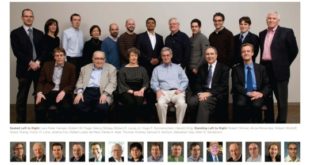Wie eine höhere Vermögenssteuer die Wirtschaft verbessern kann Das Deutsche Institut für Wirtschaftsforschung (DIW) in Berlin hat Rechnungen für eine Vermögensteuer in Höhe von einem Prozent angestellt, wie sie derzeit politisch diskutiert wird. In dem Modell gilt ein Freibetrag in Höhe von einer Million Euro für Privatpersonen und von fünf Millionen Euro, wenn diese in einem Betrieb stecken. Das bedeutet: Privatleute müssen die Steuer bezahlen, wenn sich...
Read More »The teaching of economics — captured by a small and dangerous sect
The teaching of economics — captured by a small and dangerous sect The fallacy of composition basically consists of the false belief that the whole is nothing but the sum of its parts. In society and in the economy this is arguably not the case. An adequate analysis of society and economy a fortiori can’t proceed by just adding up the acts and decisions of individuals. The whole is more than a sum of parts. This fact shows up when...
Read More »Financial economics — science or chance?
Financial economics — science or chance? Those of us who occasionally follow stock markets worldwide are usually well aware of the fact that ‘winners’ in these markets are largely the result of the harvest of chance. Occasionally, however, one hears so-called day traders express the view that it surely cannot be a question of pure luck that some stock traders consistently make winning transactions in the market. To test the sustainability of these...
Read More »Deaton on labour shortages and wages
Deaton on labour shortages and wages ZEIT: Today, the debate focuses on the labor shortages facing many industrialized countries. Angus Deaton: I am always cautious when people talk about a scarcity of labor but don’t talk about wages. The argument always is: Americans don’t want to do these jobs, Germans don’t want to do these jobs. So we have to have migrants. But in many cases, it is not that Germans or Americans don’t want to do these jobs, but that...
Read More »Does free trade — really — benefit everyone?
Does free trade — really — benefit everyone? .[embedded content] Two hundred years ago, on 19 April 1817, David Ricardo’s Principles was published. In it, he presented a theory that was meant to explain why countries trade and, based on the concept of opportunity cost, how the pattern of export and import is ruled by countries exporting goods in which they have a comparative advantage and importing goods in which they have a comparative disadvantage....
Read More »Nationalekonomi — mer fiktion än vetenskap
Nationalekonomi — mer fiktion än vetenskap Den värld vi lever i är i grunden osäker och kvantifierbara sannolikheter är undantaget snarare än regeln. Om ”Gud inte spelar tärning” som Einstein hävdade, skulle jag tillägga: inte heller människor. Världen som vi känner den kan endast i begränsad omfattning förstås utifrån antaganden om säker och fullkomlig kunskap. Dess inneboende och nästan obegränsade komplexitet och ’organiska’ samband förhindrar...
Read More »Theory and reality in economics
Theory and reality in economics So, certainly, both non-theorists and some theorists have little patience for research that displays mathematical ingenuity but has no value as social science. But defining this work exactly is impossible. This sort of work is like pornography quite simple to recognize when one sees it. Jeffrey Ely As researchers, we (mostly) want to try to understand and explain reality. How we do this differs between various disciplines...
Read More »Everything you want to know about MMT
Everything you want to know about MMT One of the positive contributions of MMT, especially from a European point of view, is that it makes it transparently clear why the euro-experiment has been such a monumental disaster. The neoliberal dream of having over-national currencies just doesn’t fit well with reality. When an economy is in a crisis, it must be possible for the state to manage and spend its own money to stabilize the economy. When the euro was...
Read More »The military-industrial complex as a variety of capitalism and threat to democracy: rethinking the political economy of guns versus butter
This paper examines the military-industrial complex (MIC), which is a prototype widely imitated by other business sectors. Collectively, they constitute a variety of capitalism which can be termed the poly-industrial complex (PIC). Understanding the MIC is critical to understanding contemporary US capitalism, US international policy, and the drift toward Cold War II. The MIC exerts […]
Read More »In praise of pluralism
from Lars Syll Recognition of the speculative value of counterfactualizing provides the grounding for a defense of theoretical pluralism in economics. The existence of multiple contending theories in economics is inconvenient, of course. It casts doubt on the truth content of the counterfactual scenarios generated by the predominant approach and challenges the predominant causal claims … But that is precisely the virtue of contending theoretical perspectives in economics. They serve to...
Read More » Heterodox
Heterodox




